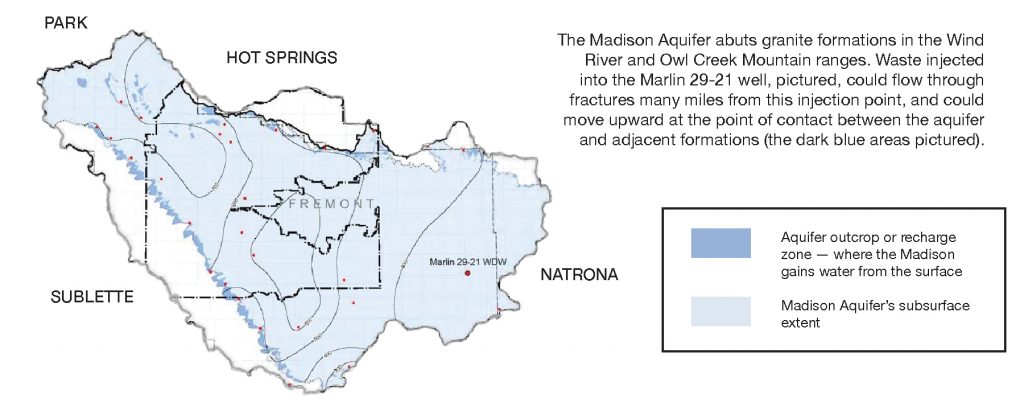Whiskey is for drinking, water is for fighting over. In the arid West, there may be no more precious resource. So why would Wyoming risk contaminating a valuable reserve of fresh water for short term economic gain?
On November 10, the Wyoming Oil and Gas Conservation Commission approved a request by Aethon Energy to dispose of billions of gallons of oil and gas waste fluids from operations in the Moneta Divide into the Madison Aquifer.
The Madison is one of Wyoming’s most important aquifers, with remarkably high water quality. The Wyoming Water Development Commission considers the aquifer critically important for the water supply of the Wind River and Bighorn basins. It also supplies over a dozen Wyoming municipalities and the Bighorn regional water system, which provides water to 15 public water systems, and many ranching operations in the Bighorn Basin, Powder River Basin, and the Black Hills.
The Madison Aquifer is a valuable water source for Wyoming, and its value will only grow as our climate continues to change and drought becomes more frequent.
Because the Madison Aquifer serves as a current and potential drinking water supply, it is protected under the Safe Drinking Water Act — which prohibits injection of oil and gas wastewater. However, a company can seek an “aquifer exemption” if they can demonstrate that the aquifer “cannot now and will not in the future serve as a source of drinking water.”
Aethon, a Texas-based investment firm, purchased the Moneta Divide oil and gas field from the previous owner, Encana, and has plans to expand the field by an additional 4,250 wells. The Moneta Divide field, east of Shoshoni, is located primarily on federal public lands managed by the Bureau of Land Management. At full field development, these wells would produce about 59 million gallons a day of oil and gas wastewater — a mix of formation and flowback water from fracking that contains toxins like benzene and high levels of salts. This produced water is dangerous for aquatic life, public health, and the environment, and must be disposed of responsibly.
The BLM’s environmental review for the project states that treating and piping the water directly to Boysen Reservoir is the preferred method of disposal. Aethon acknowledges that treatment is “a viable option for managing the total volume of produced water within the Project Area,” and that “water treatment technology is evolving quickly and will likely become less expensive and more efficient in the future.”
But for now, water treatment is expensive, and Aethon has tried several methods to shift that cost to the Wyoming public. First, Aethon proposed to dispose of vast quantities of wastewater by dumping it into tributaries that flow into Boysen and downstream to the Wind and Bighorn rivers.
Now Aethon is proposing another alternative — injecting the wastewater into the Madison. This scheme is all too familiar. Aethon’s latest proposal is the fourth attempt by an operator to secure an injection permit for the Madison. The Oil and Gas Commission rejected previous requests after thoughtful deliberation by the commission, because the risk of contaminating the aquifer was too high.

Today, the composition of the commission has changed, and Aethon has renewed its efforts. At the November hearing, the commission heard hours of testimony from Aethon’s experts arguing that the injected wastewater could be contained in one part of the aquifer. The public raised numerous concerns during the scant half hour we had to present testimony.
More than 100 citizens filed written comments, unanimously opposing an exemption. As residents of Powell stated, “The current water quality is good and could in the future be pumped to the surface for municipal and/or industrial water supplies.” A resident of Pavillion, who has been dealing with drinking water contaminated by oil and gas activity for the past 15 years, wrote, “I am in favor of responsible development of our oil and gas resources, but not at the expense of contaminating our good quality drinking water.”
Despite the public concerns, the commission voted 4–1 to approve the exemption. Wyoming State Geologist Erin Campbell, the one dissenting vote, asked her fellow commissioners before voting, “Do you want to risk contaminating a viable aquifer?” and called Aethon’s venture “a gamble I don’t feel comfortable taking.”
The Madison Aquifer is a valuable water source for Wyoming, and its value will only grow as our climate continues to change and drought becomes more frequent. The Wyoming public isn’t comfortable rolling the dice with our water supply. Wyoming should take the long view and conserve our drinking water aquifers, not jeopardize an important public resource so that Aethon can avoid the cost of water treatment.
While Wyoming has primacy over injection wells in the state, new aquifer exemptions require EPA approval. The EPA will review the existing record, including written comments and testimony from the November hearing. We’ll continue advocating the protection of the Madison and will urge the EPA to deny this exemption. We’ll also let you know when there are opportunities for the public to weigh in again. Your voices every step of the way have made a difference.

